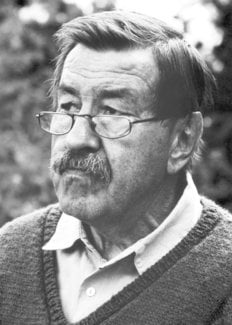Günter Grass
Biographical

Günter Grass was born in 1927 in Danzig-Langfuhr of Polish-German parents. After military service and captivity by American forces 1944-46, he worked as a farm labourer and miner and studied art in Düsseldorf and Berlin. 1956-59 he made his living as a sculptor, graphic artist and writer in Paris, and subsequently Berlin. In 1955 Grass became a member of the socially critical Gruppe 47 (later described with great warmth in The Meeting at Telgte), his first poetry was published in 1956 and his first play produced in 1957. His major international breakthrough came in 1959 with his allegorical and wide-ranging picaresque novel The Tin Drum (filmed by Schlöndorff), a satirical panorama of German reality during the first half of this century, which, with Cat and Mouse and Dog Years, was to form what is called the Danzig Trilogy.
In the 1960s Grass became active in politics, participating in election campaigns on behalf of the Social Democrat party and Willy Brandt. He dealt with the responsibility of intellectuals in Local Anaesthetic, From the Diary of a Snail and in his “German tragedy” The Plebeians Rehearse the Uprising, and published political speeches and essays in which he advocated a Germany free from fanaticism and totalitarian ideologies. His childhood home, Danzig, and his broad and suggestive fabulations were to reappear in two successful novels criticising civilisation, The Flounder and The Rat, which reflect Grass’s commitment to the peace movement and the environmental movement. Vehement debate and criticism were aroused by his mammoth novel Ein weites Feld which is set in the DDR in the years of the collapse of communism and the fall of the Berlin wall. In My Century he presents the history of the past century from a personal point of view, year by year. As a graphic artist, Grass has often been responsible for the covers and illustrations for his own works.
Grass was President of the Akademie der Künste in Berlin 1983-86, active within the German Authors’ Publishing Company and PEN. He has been awarded a large number of prizes, among them Preis der Gruppe 47 1958, “Le meilleur livre étranger” 1962, the Büchner Prize 1965, the Fontane Prize 1968, Premio Internazionale Mondello 1977, the Alexander-Majakowski Medal, Gdansk 1979, the Antonio Feltrinelli Prize 1982, Großer Literaturpreis der Bayerischen Akademie 1994. He has honorary doctorates from Kenyon College and the Universities of Harvard, Poznan and Gdansk.
| A selection of works by Günter Grass in English |
| The Tin Drum. Transl. by Ralph Manheim. London: Secker & Warburg, 1962. |
| Cat and Mouse. Transl. by Ralph Manheim. San Diego: Harcourt Brace, 1963. |
| Dog Years. Transl. by Ralph Manheim. New York: Harcourt, Brace & World, 1965. |
| Four Plays. Introd. by Martin Esslin. New York: Harcourt, Brace & World, 1967. |
| Speak out! Speeches, Open Letters, Commentaries. Transl. by Ralph Manheim. London: Secker & Warburg, 1969. |
| Local Anaesthetic. Transl. by Ralph Manheim. New York: Harcourt, Brace & World, 1970. |
| From the Diary of a Snail. Transl. by Ralph Manheim. New York: Harcourt Brace Jovanovich, 1973. |
| In the Egg and Other Poems. Transl. by Michael Hamburger and Christopher Middleton. New York: Harcourt Brace Jovanovich, 1977. |
| The Meeting at Telgte. Transl. by Ralph Manheim. New York: Harcourt Brace Jovanovich, 1981. |
| The Flounder. Transl. by Ralph Manheim. New York: Harcourt Brace Jovanovich, 1978. |
| Headbirths, or, the Germans are Dying Out. Transl. by Ralph Manheim. New York: Harcourt Brace Jovanovich, 1982. |
| The Rat. Transl. by Ralph Manheim. San Diego: Harcourt Brace Jovanovich, 1987. |
| Show Your Tongue. Transl. by John E. Woods. San Diego: Harcourt Brace Jovanovich, 1987. |
| Two States One Nation? Transl. by Krishna Winston with A.S. Wensinger. San Diego: Harcourt Brace Jovanovich, 1990; London: Secker & Warburg. |
| The Call of the Toad. Transl. by Ralph Manheim. New York: Harcourt Brace Jovanovich, 1992. |
| The Plebeians Rehearse the Uprising. Transl. by Ralph Manheim. New York: Harcourt Brace, 1996. |
| My Century. Transl. by Michael Henry Heim. New York: Harcourt Brace, 1999. |
| Too far afield. Transl. by Krishna Winston. London: Faber, 2000. |
Günter Grass died on 13 April 2015.
This autobiography/biography was written at the time of the award and first published in the book series Les Prix Nobel. It was later edited and republished in Nobel Lectures. To cite this document, always state the source as shown above.
Nobel Prizes and laureates
Six prizes were awarded for achievements that have conferred the greatest benefit to humankind. The 14 laureates' work and discoveries range from quantum tunnelling to promoting democratic rights.
See them all presented here.
